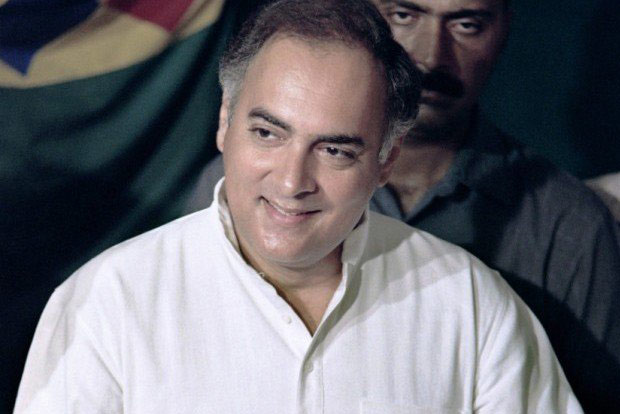Rajiv case: Supreme Court asks Centre to decide on TN letter on remission
The Supreme Court asked the Centre to take a decision within three months on a 2016 letter by Tamil Nadu government seeking its concurrence on releasing seven convicts in the Rajiv Gandhi assassination case.;
By : migrator
Update:2018-01-23 19:52 IST

New Delhi
The letter written on March 2, 2016, had said that while the state government has already decided to release the seven convicts, it is necessary to seek the Centre's concurrence as per an apex court order of 2015.
A bench of Justices Ranjan Gogoi, A M Sapre and Navin Sinha allowed the application moved by the seven convicts and asked Additional Solicitor General Pinky Anand to take a call on the letter of the state government within three months.
Senior advocate Rakesh Dwivedi, appearing for Tamil Nadu government, also supported the demands of the convicts and said the Centre should respond to the letter.
Rajiv Gandhi was assassinated on the night of May 21, 1991 at Sriperumbudur in Tamil Nadu by a woman suicide bomber, identified as Dhanu, at an election rally. Fourteen others, including Dhanu herself, were also killed.
This was perhaps the first case of suicide bombing which had claimed the life of a high-profile global leader.
Advocate Prabhu, who appeared for the seven convicts -- V Sriharan alias Murugan, T Suthendraraja alias Santham, A G Perarivalan alias Arivu, Jayakumar, Robert Payas, P Ravichandaran and Nalini, said they have been in jail for 25 years now and have remained stuck between two governments.
He said the convicts in their application were seeking a direction from the court to Centre to take a call on the letter written by state government either way.
Prabhu argued that the first letter written by the state government in February 19, 2014, seeking to remit the life sentence of seven prisoners after 23 years of their custody has now become infructuous as it had only sought an opinion.
After the constitution bench verdict in 2015, the "concurrence" of Union of India was necessary, he said.
Prabhu contended that in March 2016, the state
government's letter sought the Centre's concurrence for remission of the sentence of the convicts, but the Union of India has not taken a decision over it till now.
He said even the review petition filed by the state government against the constitution bench verdict of 2015, has been dismissed last year.
The Supreme Court had on February 18, 2014, commuted the death sentence of three convicts — Murugan, Santhan and Perarivalan — citing inordinate delay by the executive in deciding their mercy plea.
A day after on February 19, 2014, the then J Jayalalitha government in Tamil Nadu wrote a letter to then UPA government at the Centre seeking its opinion on the remission of the sentences awarded to all the seven convicts.
Instead of giving its opinion, the Centre had rushed to the Supreme Court claiming itself as the competent authority to decide on remission and not the state government, under the provisions of the Code of Criminal Procedure.
The apex court on February 21, 2014, passed an interim order and stayed the release of all seven convicts in the case and referred the matter to a five-judge constitution bench.
The Centre had asserted that the killers of former Prime Minister did not deserve any mercy as the assassination was the result of a conspiracy involving foreign nationals.
The Tamil Nadu government, on the other hand, had said that the states have power to grant remission under the law and trashed the accusations that its decision to release the seven convicts was "political and arbitrary".
On December 2, 2015, the constitution bench held that the Centre has "primacy" over state's right to grant remission and its "concurrence" is necessary before freeing the convicts in certain cases.
On February 8, 2017, the top court dismissed the pleas of the Tamil Nadu government and one convict A G Perarivalan alias Arivu seeking review of its judgement.
After Gandhi's assassination on May 21, 1991, the probe was transferred to a Special Investigation Team of the CBI on the request of the Tamil Nadu government.
The SIT had chargesheeted 41 accused — including 12, who died in the blast and three who were absconding — before a TADA court in Chennai. The prolonged trial culminated in 1998, when the TADA court sentenced 26 of the accused to death.
In May 1999, the apex court upheld the death sentence of four, including Murugan, Santham, Perarivalan and Nalini, commuted the death sentence of three to life, and freed the remaining 19.
In April 2000, the Tamil Nadu governor commuted the death sentence of Nalini on the basis of state government's recommendation and an appeal by former Congress president Sonia Gandhi.
The death sentence of remaining three convicts were commuted in February 2014, by the apex court on the ground of inordinate delay of eleven years in deciding the mercy petitions.
Visit news.dtnext.in to explore our interactive epaper!
Download the DT Next app for more exciting features!
Click here for iOS
Click here for Android

